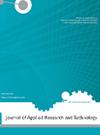Effect of cetyltrimethylammonium bromide on flocculation and filtration of bentonite suspensions
Q3 Engineering
Journal of Applied Research and Technology
Pub Date : 2024-02-29
DOI:10.22201/icat.24486736e.2024.22.1.2112
引用次数: 0
Abstract
Separation of bentonite from wastewater is challenging because bentonite, is highly dispersible in water. Using cationic polymer flocculants has a high flocculation effect on bentonite. However, the flocculation mechanism is unclear. In this study, flocculation, filtration, and bentonite adsorption behavior are investigated using cetyltrimethylammonium bromide (CTAB) as cationic small molecule; subsequently, the flocculation mechanism of bentonite is explored. The flocculation effect increases and the filtration time is reduced with increasing CTAB concentration. In particular, when more than 1500 ppm of CTAB is used, the filtration time is reduced to 2–3 min. Bentonite forms secondary flocculates after the formation of primary flocculates with increasing CTAB concentration. Additionally, the adsorption behavior reveals that CTAB is inserted between the layers, and it is excessively adsorbed on the bentonite surface. The increase CTAB concentration was effective in improving the shortening the filtration time owing to the formation of large bentonite flocculates.十六烷基三甲基溴化铵对膨润土悬浮液絮凝和过滤的影响
从废水中分离膨润土具有挑战性,因为膨润土在水中具有高度分散性。使用阳离子聚合物絮凝剂对膨润土有很高的絮凝效果。然而,絮凝机理尚不清楚。本研究以十六烷基三甲基溴化铵(CTAB)为阳离子小分子,研究了絮凝、过滤和膨润土吸附行为,并探索了膨润土的絮凝机理。随着 CTAB 浓度的增加,絮凝效果增强,过滤时间缩短。特别是当 CTAB 的浓度超过 1500 ppm 时,过滤时间会缩短至 2-3 分钟。随着 CTAB 浓度的增加,膨润土在形成一级絮凝物后会形成二级絮凝物。此外,吸附行为表明 CTAB 被插入层间,并被过度吸附在膨润土表面。CTAB 浓度的增加能有效缩短过滤时间,这是因为膨润土形成了大的絮凝体。
本文章由计算机程序翻译,如有差异,请以英文原文为准。
求助全文
约1分钟内获得全文
求助全文
来源期刊

Journal of Applied Research and Technology
工程技术-工程:电子与电气
CiteScore
1.50
自引率
0.00%
发文量
0
审稿时长
6-12 weeks
期刊介绍:
The Journal of Applied Research and Technology (JART) is a bimonthly open access journal that publishes papers on innovative applications, development of new technologies and efficient solutions in engineering, computing and scientific research. JART publishes manuscripts describing original research, with significant results based on experimental, theoretical and numerical work.
The journal does not charge for submission, processing, publication of manuscripts or for color reproduction of photographs.
JART classifies research into the following main fields:
-Material Science:
Biomaterials, carbon, ceramics, composite, metals, polymers, thin films, functional materials and semiconductors.
-Computer Science:
Computer graphics and visualization, programming, human-computer interaction, neural networks, image processing and software engineering.
-Industrial Engineering:
Operations research, systems engineering, management science, complex systems and cybernetics applications and information technologies
-Electronic Engineering:
Solid-state physics, radio engineering, telecommunications, control systems, signal processing, power electronics, electronic devices and circuits and automation.
-Instrumentation engineering and science:
Measurement devices (pressure, temperature, flow, voltage, frequency etc.), precision engineering, medical devices, instrumentation for education (devices and software), sensor technology, mechatronics and robotics.
 求助内容:
求助内容: 应助结果提醒方式:
应助结果提醒方式:


